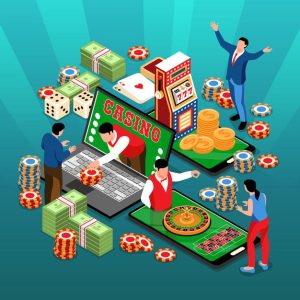Gambling is a standard, socially acceptable, and legal activity in most cultures around the world. This can be a game where you bet on something of value (usually money) or that an event will occur that is unpredictable and determined by chance. The types of gambling that are generally available are the National Lottery, scratch cards, internet gambling, casino games, sports betting, bingo, slot machines, and private betting.
 Pathological gambling is characterized by a persistent, recurrent, and frequently growing desire to gamble. It negatively impacts a person’s social life and can result in debt, the breakup of family relationships, and a diminished interest in furthering one’s career.
Pathological gambling is characterized by a persistent, recurrent, and frequently growing desire to gamble. It negatively impacts a person’s social life and can result in debt, the breakup of family relationships, and a diminished interest in furthering one’s career.
Pathological gambling usually develops in early adolescence in men (later in women) and has a chronic, progressive course with alternating periods of abstinence from gambling and relapses. Currently, gambling tendencies are more common among men, but the prevalence among the opposite sex is on the rise. Women usually start gambling at an older age than men, but they develop gambling problems more quickly.
Teens are more likely than adults to gamble, and they are also more likely to experience gambling-related issues. Although the law prohibits gambling for those under 18 years of age, studies have found that nearly three-quarters of adolescents have violated this requirement in the previous year and that the prevalence of problem and pathological gambling among them is almost twice that of adults. Gambling participation in this group has a strong association with alcohol and other substance abuse, as well as depression. In addition, there is some evidence of an association between early onset of gambling and more excellent subsequent gambling and adverse outcomes.
The turning point, the initial push, can be the initial winning of the “big jackpot” or some complex events in your personal life: problems with your partner, divorce, pregnancy of your partner, or professional failures.
Although there are many variables that contribute to the development of gambling addiction, the following are the most significant ones:
- violations in the area of self-esteem (“narcissism”);
- violations in the field of interpersonal relationships;
- dysregulation of one’s state of arousal.
Self-esteem disorders.
The violation of one’s assessment is of particular importance, and a feeling of emptiness around oneself accompanies it. Fantasies about greatness and omnipotence compensate children’s deeply rooted inferiority complexes. Initial profits strengthen self-esteem and awareness of self-importance and confirm a certain exclusivity. At the beginning of the journey, there is often a “big jackpot,” an easy and quick win, a starting impetus for escaping your fantasy world.
Disorders in the area of interpersonal relationships.
British child psychiatrist John Bowlby created the attachment theory in the sixties of the 20th century. He found that different types of attachments arise depending on the mother’s sensitivity and ability to tune in to the child. With an “insecure-avoidant” attachment, children, for example, are not sure the person they are attached to is available to them. They feel that their wishes are fundamentally rejected; such symptoms are usually present in children who have been rejected often. Children with this type of attachment are much more susceptible to various kinds of mental disorders compared to children with a “secure” type of attachment.
In addition, people obsessed with gambling often exhibit states of “break with home,” in particular, poor relationships with their fathers. Usually, in the patient’s background, one can detect an experience of disappointed expectations and disappointments.
Dysregulation of one’s state of arousal.
 The inability to regulate one’s own internal tension and arousal manifests itself, for example, in the special, constantly present anxiety of a gambler. At first, the motivation to play may be the desire to win and succeed, to overcome boredom and monotony, or to overcome negative emotions, for example, after a divorce or breakup. Gradually, the player finds himself in a vicious circle, the victims of all areas of the individual’s life.
The inability to regulate one’s own internal tension and arousal manifests itself, for example, in the special, constantly present anxiety of a gambler. At first, the motivation to play may be the desire to win and succeed, to overcome boredom and monotony, or to overcome negative emotions, for example, after a divorce or breakup. Gradually, the player finds himself in a vicious circle, the victims of all areas of the individual’s life.
The player gets joyful excitement during the game and tries to find excuses and logical explanations for his uncontrolled gameplay. The player may also develop superstitious and magical thinking. Gradually, he goes further and further into the world of his fantasies about greatness and success. A person becomes alienated from his usual social circle and begins to sink deeper into loneliness. Along with this, the way of thinking gradually begins to change. The game becomes the main activity of life, leading to a physical, spiritual, and social decline in personal development.
A gambler is also characterized by a reduced ability to control his impulses; that is, he cannot entirely resist the internal desire to gamble, just as a patient treated for alcohol addiction, after being discharged from a drug treatment clinic, often cannot resist the craving for a bottle, which may suddenly appear again. Despite numerous negative consequences, the patient’s desire to relieve stress through gambling increases.
Consequences of gambling addiction
As a result, a typical dynamics of addiction development appears, which covers all areas of life. Ultimately, there are minimal options for regulating the behavior of a person suffering from such addictions.
The dynamics of addiction development manifest themselves in attempts to win back what they have lost immediately. This leads to progressive social isolation of the person. Feelings of guilt and shame appear, but the fact of the game is hidden. A person is increasingly integrated into a particular environment of a gambler with a corresponding lifestyle, which is based, first of all, on reducing other needs. This can also lead to criminal acts to obtain money for gambling.
Finally, this can lead to financial bankruptcy, loss of family support, and the threat of termination of professional career. Staying in psychiatric hospitals after suicide attempts can lead to the criminalization of a person.
…
